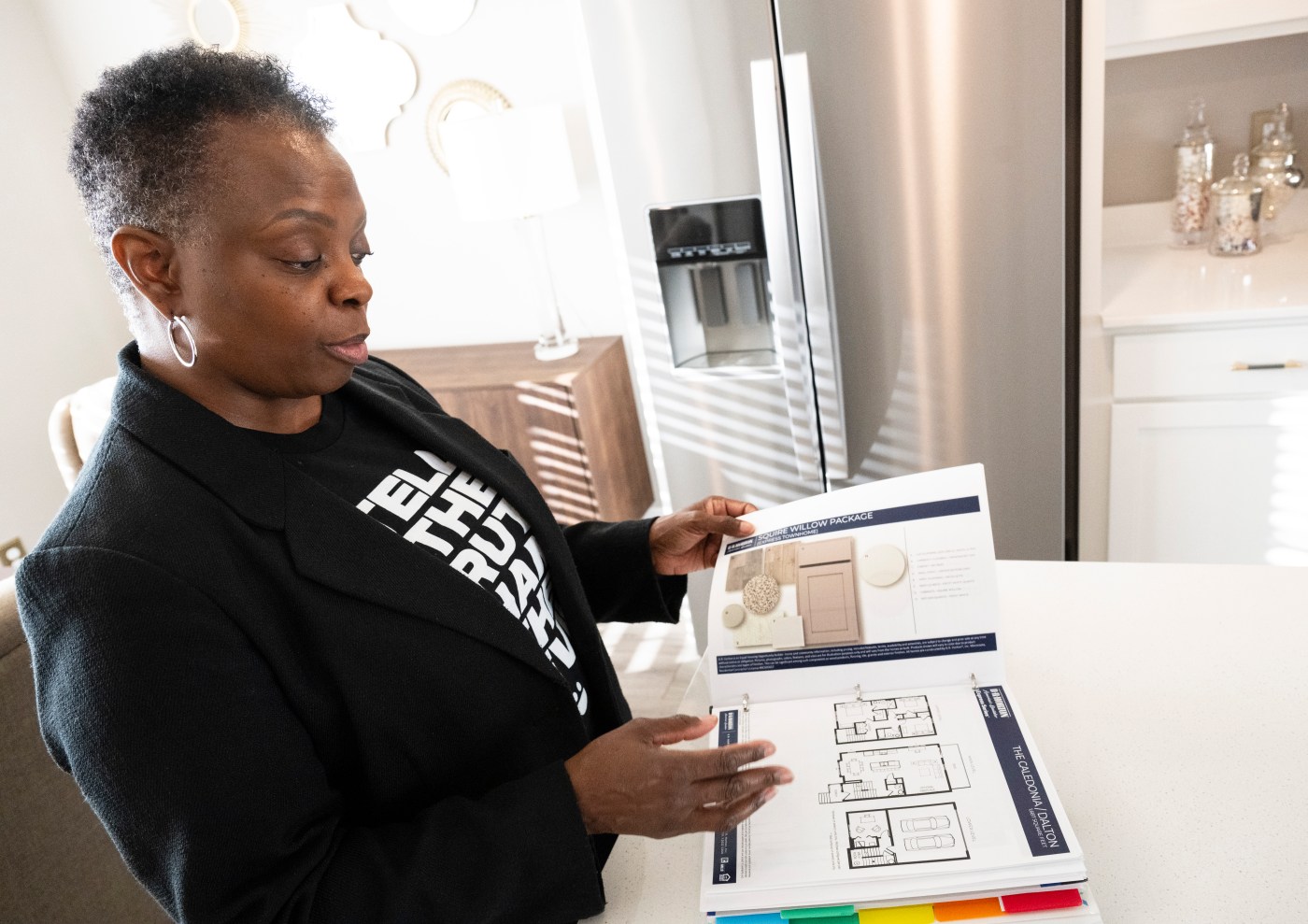
As Habitat for Humanity builds homes in St. Paul, other Habitat programs help people buy existing homes
Bridgette Blount lived in a one-bedroom apartment for many years before her first grandchild was born in 2020. That’s when she decided it was time to buy her own home to entertain her grandson and host family for the holidays.
Blount, who is 57, began working with Twin Cities Habitat for Humanity in March of this year and closed on her Blaine townhouse in June. She worked with another lender before finding Habitat’s services and said she could easily pick up where she left off with the Advancing Black Homeownership Program, a special purpose credit program.
While going through the necessary processes, Blount said she attended six weeks of the program, one meeting every Saturday, that helped prepare people for the home-buying process and homeownership.
“People were there from all walks of life, some people needed financial coaching while some were ready to buy,” Blount said. “With all the knowledge that they give you, when you leave there you should have no questions.”
The program is another side of Twin Cities Habitat for Humanity, which has 4,000 volunteers building 30 houses this week at the Heights, an environmentally sustainable community being developed at the former Hillcrest Golf Course site on St. Paul’s East Side, as this year’s Jimmy and Rosalynn Carter Work Project. The Work Project, an annual homebuilding effort launched in 1984 by former President Jimmy Carter, draws corporate donors, lawmakers, faith leaders and business executives together for a week of homebuilding.
The Work Project kicked off Monday with celebrity hosts Garth Brooks and Trisha Yearwood delivering remarks — and Jimmy Carter stories — at the work site.
Special purpose credit program
Crew Etheridge, Bridgette Blount’s 4-year-old grandson, looks around his bedroom at his grandmother’s house in Blaine on Wednesday, Sept. 25, 2024. Blount was able to purchase a townhome in Blaine with help from Twin Cities Habitat for Humanity. (John Autey / Pioneer Press)
The Advancing Black Homeownership Program meets the special credit needs of people who have been impacted by systemic racism, lending discrimination and redlining, according to Habitat Financial Coach Pearll Warren.
“Historically financial institutions have relied on identifying geographical areas with high concentrations of poverty to offer special credit interventions, but Twin Cities Habitat for Humanity is one of the first to create a race-explicit special purpose credit program.”
Although this was not Blount’s first time buying a house, she said this was the smoothest process she’s been through. They answered her questions and were there if she had more.
“When I had bought a house before, I didn’t have nothing close to this,” Blount said. “What sticks with me the most is how they took care of us throughout this process.”
Blount utilized Habitat’s open market home-buying track, meaning she could pick any house on the market in the Twin Cities metro area. With this path, a client needs to obtain their own realtor and go through the home-buying process similarly to the normal market, according to Warren.
In Blount’s case, she was pre-approved for a mortgage through the previous lender she worked with and already picked out a house on the market, so her process was faster than what could be expected. She said the time frame depends on how prepared someone is for Habitat to help them best.
Warren said the other home-buying path allows clients to purchase a habitat-developed or habitat-rehabbed property through its matching pool. They would receive letters from Habitat that include properties available within their pre-qualification range.
Both of these paths provide access to down payment assistance and other subsidies offered through the program.
Homeownership path
Habitat also offers financing options for a low-interest mortgage through its partnership with TCHFH Lending Inc., Habitat’s nonprofit mortgage company. The TruePath Mortgage offers benefits like a fixed interest rate, 30-year term and monthly payments set to no more than 30% of gross income. Warren said Habitat’s nonprofit status provides them access to down payment assistance programs and funding to subsidize mortgages for low- and middle- income families.
For more information go to tchabitat.org.
While homeownership may feel impossible for many, Blount says Habitat can help make it possible no matter where someone is in the process and even if they don’t qualify just yet.
“They’re gonna tell you what you need,” Blount said. “So don’t think ‘Because I’m in this place now, I won’t be able to.’ You’re in this place right now, this place right now could be prepping to that next place, which is homeownership.”
Warren said it’s a privilege to have the opportunity to work with people at multiple stages and guide them in achieving their goals.
“The more you apply yourself, the more we are going to work with you and make sure you achieve the goal of homeownership not just by purchasing a home, but by sustaining that home for generations to come,” Warren said.
Bridgette Blount slices a green pepper in the kitchen at her Blaine home on Wednesday, Sept, 25. 2024. (John Autey / Pioneer Press)
As Blount is settling into her new home, the milestone she’s looking forward to the most is hosting Thanksgiving dinner.
“That’s my holiday, that’s my favorite time of the year to cook,” Blount said. “I’m gonna crack the windows and doors and just have a wonderful time preparing my holiday meal.”
Related Articles
Why Twin Cities Habitat for Humanity no longer makes buyers help build their homes
As President Jimmy Carter turns 100 in hospice, celebrity home builders Garth Brooks, Trisha Yearwood pay their respects
10 tiny house design ideas you can steal for any space
Have questions about home buying? Get answers at Thursday’s housing fair.
Q-and-A with Habitat for Humanity’s Chris Coleman and Cathy Lawrence


